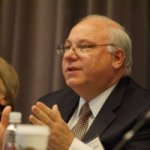
The historic decision by Detroit to declare bankruptcy under the rarely used Chapter 9 clause has not only upended municipal bond markets, but it has also focused more attention on municipal pensions and created an odd endorsement to protect the city’s 20,000 pensioners from having their benefits cut or eliminated by Michigan’s Republican Governor Rick Snyder.
Speaking on Meet the Press (Sunday, July 21, 2013), Governor Snyder noted that a combination of a nagging $18 billion debt, declining population, eroding tax base and unfunded liabilities for the city’s pension funds, had all proved to be insurmountable fiscal problems. As a result, Detroit made news July 19, when it declared bankruptcy.
But in a politically uncharacteristic statement, Governor Snyder said the city pensioners needed protection from creditors, so their future benefit payments could continue uninterrupted. In an interview with Meet the Press host David Gregory, Snyder said he has asked the bankruptcy judge to represent retirees since no one had been appointed to represent their interests. Snyder noted that the citys’ unfunded pension liabilities were a main issue in the bankruptcy since the funded portion was stable and performing as expected.
At issue in the Detroit bankruptcy is whether the city’s pensions are a contractual obligation and as an unsecured claim can continue to be paid if they “impair or diminish” the city’s ability to meet its civil operational obligations, according to bankruptcy attorney James E. Spiotto, a partner with Chapman & Cutler LLP in Chicago. Spiotto says Detroit’s Chapter 9 bankruptcy filing also is an attempt to cut pension benefits.

Speaking on Bloomberg Radio, Spiotto said that pension advocates, who are asking for relief under a constitutional provision, will have to consider whether meeting the existing pension obligations would jeopardize the city’s ability to pay its other creditors, while the city simultaneously delivers its other essential services. However, unlike other forms of bankruptcy, judges in Chapter 9 situations have a very limited role, which is why the case may make its way to the Supreme Court.
Snyder’s advocacy on behalf of the city’s 20,000 pensioners is noteworthy because the official Republican position is anti-public employee pensions. This position is fueled by a combination of being anti-union, anti-pension, anti-deficit, and the conservative view that any form of public old-age and retirement income support, including Social Security, are remnants from the socialist New Deal and have to be repealed for political, fiscal and even religious reasons.
So differing dramatically from this core Republican position, Snyder’s statements calling for a public pensioner advocate in the bankruptcy proceedings is noteworthy. By asking “Who speaks on behalf of the pensioners?” Snyder is repeating a similar position I made in a Barron’s editorial which asked “Who speaks on behalf of mutual fund shareholders?” when it comes to representing the interests of individual shareholders in terms of fees, conflicts-of-interest and the lack of a fiduciary standard.
In the public pension area, there is a $2 trillion in unfunded pension liabilities, according to Moody’s. While this is a staggering amount, it is a sum which took years to accumulate. These unfunded sums occurred in public pension plans which were managed and advised by the best financial advisers, consultants, investment managers and ERISA lawyers money could buy. They were also supervised by union and public government officials, and in some cases independent board members, who all had a role in managing and designing the plans.
It would be naïve to assume these unfunded liabilities occurred quickly or in a vacuum. It is also a certainty that every consultant and investment professional who advised a public pension system was paid every cent they billed, even when some public pensioners nationwide were asked to accept curtailed, delayed or eliminated benefits. And in the vast majority of cases, these same pension experts have remained silent and unaccountable when it comes to defending their work designing and administering these pension funds.
Time for Pension and Mutual Fund Industry Advocates
 Just as the mutual fund industry needs advocates for individual shareholders, public pension funds also need to be better represented when it comes to making decisions which determine the future of thousands of retirees
Just as the mutual fund industry needs advocates for individual shareholders, public pension funds also need to be better represented when it comes to making decisions which determine the future of thousands of retirees
In the mutual fund industry, load-funds should create a new executive-level position of shareholder advocate. The advocate would examine fund activities involving products, sales materials, sales practices, shareholder communications, key account relationships and lobbying to determine how fund company’s activities are benefitting shareholders—if at all.
A shareholder advocate could offer a new perspective to counter the build-in slant of selling funds using 12b-1 fees, revenue sharing and selective transparency. Since these practices are being challenged at the national level, it’s only fitting that a load-fund company would want to anticipate future changes and be prepared for new rules which would affect its daily operations. Even if any reform is beaten back, the effort will be so contentious and visible that it will further alienate reform-minded investors. The advocate would work to bridge the misalignment of interests that exists between load-fund companies and their customers.
The shareholder advocates would work at the management level. They would not be independent board members. While many fund-company boards have independent directors, they are more advisory, rarely implement daily business actions and have limited contact with company staff.
“Independent fund directors have failed as fiduciaries in their legal roles as shareholder watchdogs,” says J.A. Haslem, professor emeritus of business at the University of Maryland, in College Park. Alan R. Palmiter, professor of law at Wake Forest University, declares that the 1940 Investment Act, which handed regulatory oversight of mutual-fund advisers to the independent directors rather than to the SEC, “has not provided essential fiduciary protections to fund shareholders.” An empowered, full-time advocate would be able to change this.
While the advocate idea may be new in the securities industry, they exist in other industries and professions, where they are entrusted with assisting over people who are unable or less sophisticated to make complicated decisions. This situation exists where there is a “standard and care” guideline in the real estate and health care industries, for example, where less sophisticated buyers rely on the professional judgment of trained professionals to provide the best possible advice needed to deliver the best possible long-term result.
In the financial industry, fund companies and advisors polish a professional reputation to attract more business. But the entire industry suffers when a fund company or advisor is cited for breaking regulations because the average shareholder or adviser’s customers cannot distinguish among high-quality, medium-quality and unethical or incompetent providers.
This “information asymmetry” according to Yale Law School Professor Jonathan R. Macey, “reduces the market’s demand and willingness to pay for financial planners because consumers have less information than producers.”
Just as it is needed in public pension funds, shareholder advocates at mutual fund companies would voice employee concerns about a fund company’s business practices to assure that shareholders are getting the best value possible. This would not be a theoretical exercise. Studies have shown a direct link between fund expenses and fund performance, so the fund advocate would also drive toward a bottom line impact on shareholder returns.
But as Governor Snyder has pointed out in the Detroit bankruptcy case, no one speaks for Detroit’s 20,000 pensioners. Similarly, no one inside fund companies speaks for the millions of load-fund shareholders, who are not well-represented in their own fund companies. Better representation for pensioners and shareholders would be in the best financial interests of all concerned.










